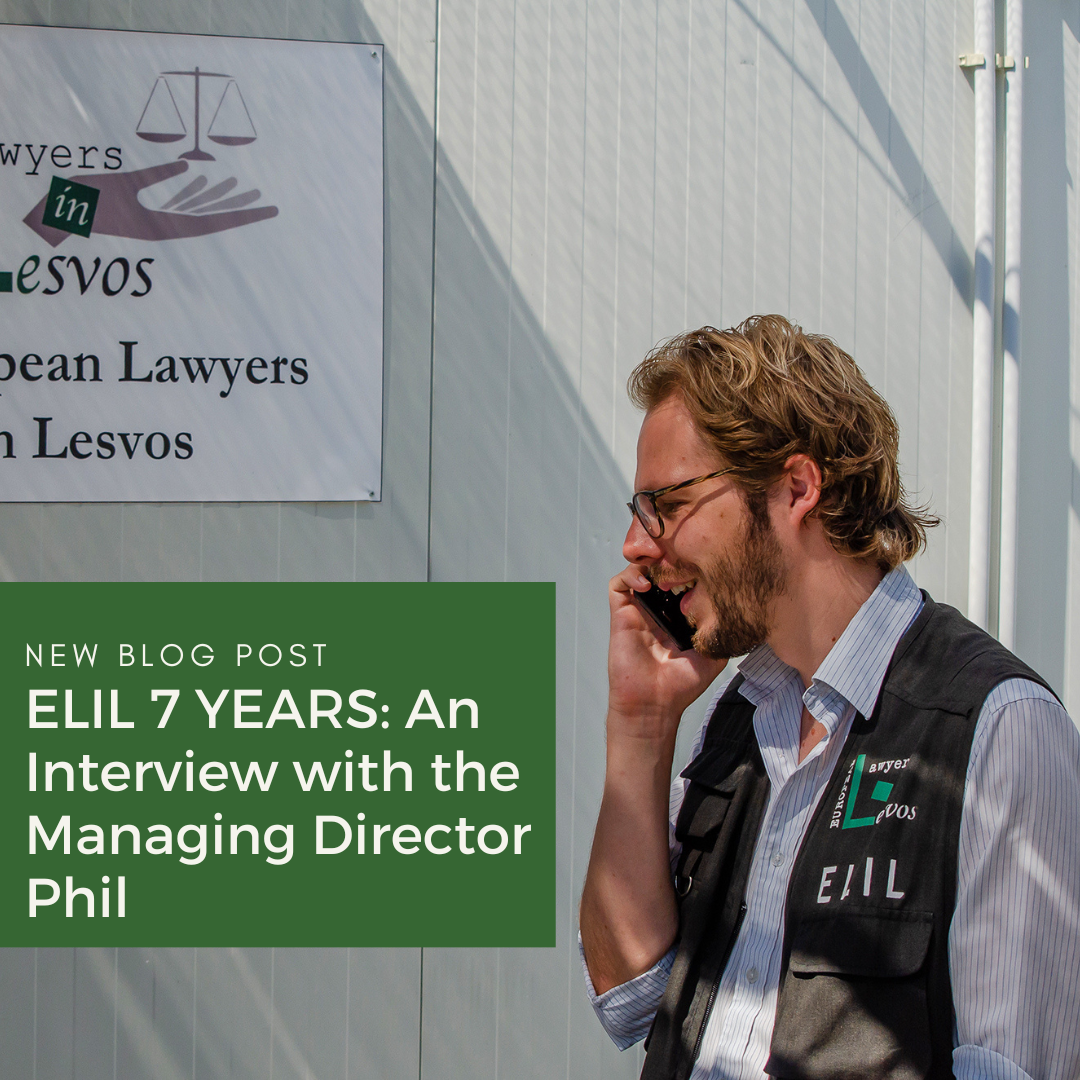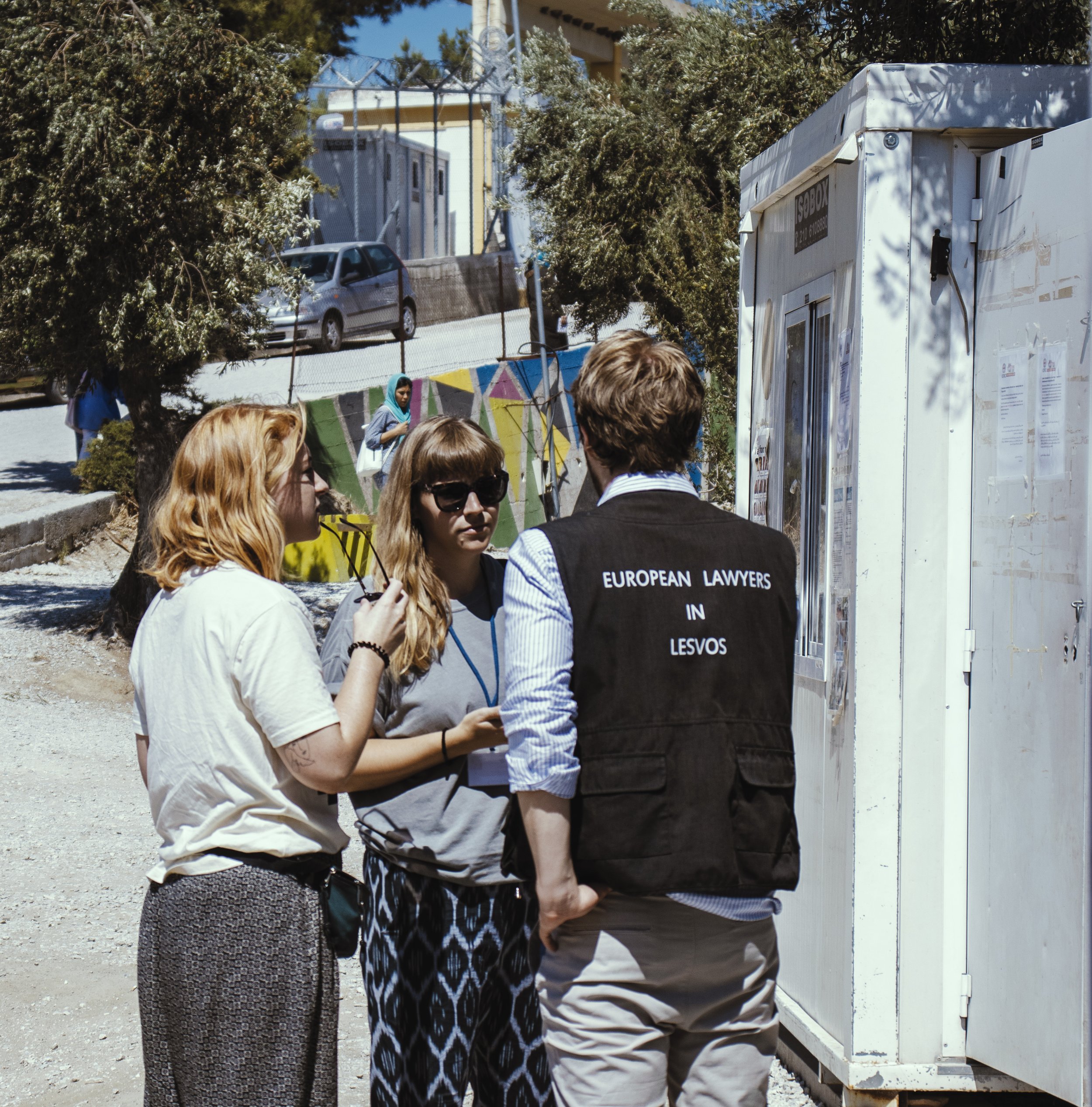How has the nature of your work evolved over the past years?
Our work has experienced significant changes, but has fundamentally stayed the same. Starting as a small group of volunteers in one location, we have evolved into an organisation with 35 staff members and volunteers across six locations in two countries.
Our focus has always been on addressing the critical lack of legal support for refugees at the European borders. Our belief – and goal – is that every refugee should have access to an independent, expert asylum lawyer throughout their asylum procedure.
The pressing need first emerged on Lesvos at the end of 2015 and the beginning of 2016, and it continues to be the location where this need is most evident. Thousands of people arrive each year and undergo the asylum procedure without any state-provided legal assistance. They are expected to navigate this complex process, which determines their asylum status in Greece and their physical safety, within a short timeframe and with no support. This was the case back in 2016 and, unfortunately, has worsened over the last seven years, which has led us to expand our work beyond Lesvos, first to Samos (2020), then Athens (2021) and Thessaloniki (2022).
In the face of these challenges, the European legal profession has demonstrated unwavering support for our organisation, illustrating its commitment to the profound importance of upholding the rule of law and protecting human rights. I believe this is because our work aligns with the fundamental role of a lawyer: providing the best possible advice and helping our clients navigate legal procedures effectively. This principle extends to our work in Poland (Warsaw and the Belarus border), where our goal is the same - namely to ensure access to legal assistance for those who have been forced to flee their homes and are seeking protection.
“ I believe this is because our work aligns with the fundamental role of a lawyer: providing the best possible advice and helping our clients navigate legal procedures effectively. ”
Regarding my role within the organisation, I would say that as ELIL has undergone growth, my role has shifted from hands-on management to a more strategic position. I now focus on long-term planning, managing a larger team and maintaining strong relationships with donors, Bar Associations and other stakeholders. Overall, though, upholding our mission and principles remains my top priority – what this means in practice is trying to ensure that as many refugees as possible receive expert legal support.
In summary, our organisation has evolved and expanded over the past years, but our core mission and principles have remained steadfast. We continue to address the critical need for legal support for refugees, help people navigate complex legal processes and work to uphold the rule of law and protect human rights. Our work may have changed in scope, but our unwavering commitment to empowering those in need and upholding their rights remains at the heart of everything we do.
What is one of your earliest memories with ELIL?
Phil in Moria camp in front of the ELIL container with 2 volunteer lawyers
My earliest memories with ELIL involve two cases that highlighted the importance and need for legal assistance. In the first case, a man from Iraq approached us in Moria camp on Lesvos. He had already done his interview, but wanted some information about the next steps. He explained that, during his interview, he told the Greek authorities that he is a truck driver willing to work hard, pay taxes and contribute to society in Greece. However, he later disclosed to us that he belonged to a persecuted religious minority and his family had been killed by a militia. He had not revealed this during his interview, fearing it would make him appear vulnerable or burdensome. Whilst his approach was completely logical to those unfamiliar with asylum law, it was highly detrimental to his case as it meant he was automatically labelled as an economic migrant. If he had sought legal advice before his interview, he would have been better equipped to truthfully present his case and would have been far more likely to be granted the protection his circumstances warranted. This particular case underscored the importance, and need, of legal assistance.
On the other hand, I remember our first successful case, where a man from a country in West Africa received a positive asylum decision. We had worked extensively with him, gathering evidence of his involvement in human rights activism. The joy and relief we felt upon his positive outcome was profound. It was especially meaningful as it challenged the authorities' assumptions – as his country of origin is not considered to be a high-risk country - and showcased the difference legal assistance can make, especially in cases where the need for protection may not be immediately obvious.
In what ways has the demand for legal assistance changed and how has ELIL adapted its services?
ELIL has continuously adapted to the shifting landscape and the changing need for legal assistance. The past seven years have witnessed frequent policy, procedural and legislative changes, and ELIL has adjusted accordingly. While our core work remains centred around preparing individuals for their asylum interviews, it has become more complex. Administrative support has become increasingly vital, as accessing and navigating the asylum procedure has become more challenging. At the same time, there has been a significant shift in the speed of the procedure, transitioning from an extremely slow process back in 2016 to a very quick one – for example, on Lesvos, the whole procedure can now be concluded within two weeks of arrival. In this extremely limited timeframe, we must promptly connect with the people upon their arrival, provide essential legal information, prepare them through one-on-one consultations, gather necessary documents, draft supporting written submissions and, where possible, represent them at interview.
In response, ELIL has adapted its approach and boosted capacity, in order to assist as many people as possible. Our flexible approach, coupled to partnerships such as the Greece Pro Bono Collaborative, help us reach more people within the limited time frame. Nevertheless, the overarching concern remains that there is a continuous trend of stricter procedures, reduced safeguards, faster timelines, and a future EU Asylum Pact that may exacerbate the situation.
In terms of impact, ELIL's has assisted over 17,000 people over the past seven years. The organisation consistently achieves recognition rates that are double the Greek average, emphasising the value of legal support during the procedure. This core activity – providing expert legal assistance in relation to the asylum interview – remains our most important one. Other more specialised activities, such as the assistance provided to unaccompanied children in relation to age assessment, ensuring suitable accommodation and family reunification, are also vital. At the same time, on a more general level, it is important to demonstrate to people that there are lawyers on their side who are committed to fighting for their rights and upholding fundamental legal principles and safeguards.
One other major adaptation relates to the geographical scope of our work. The need expands well beyond Lesvos and, indeed, beyond Greece. This, of course, is not a new development, but ELIL now has greater capacity to respond – notably through our four offices across Greece and our new projects in Poland. In particular, the project to support refugees crossing the Poland-Belarus border, which began earlier this year, implements the exact same model and principles as our work in Greece. We assist those crossing the border in applying for asylum, we work to secure their release from detention and support with their asylum application. This project was initiated because we saw clear parallels with the situation in Greece – namely, large numbers of refugees arriving with not enough lawyers to assist them, a strict and quick asylum procedure and a lack of state-provided legal aid.
One thing that has not changed is that there are simply not enough lawyers in comparison with the need. Capacity remains the primary challenge for ELIL. The increasing number of arrivals – with more people arriving to Greece in 2022 than in any year since 2019 - coupled to a scarcity of lawyers, creates an ongoing struggle to assist all those in need. The organisation strives to boost its capacity through strategic planning and fundraising, always with the aim of getting more lawyers and more interpreters, and remains committed to protecting people's rights and providing comprehensive assistance.
What inspired you to establish ELIL?
I had always wanted to use my skills and expertise as a lawyer to help people, but I had followed a different path at the start of my career and was working as a commercial lawyer. Then, I saw the situation in Lesvos at the end of 2015 and decided I had to do anything I could to help.
I left my job at a commercial law firm and headed to Greece with the aim of helping in any way that I could. I didn't have a clear picture of what that would look like, but I knew I had to do something. Therefore, when I arrived in Lesvos in January 2016, I came as an independent volunteer, not as a lawyer. For months, along with countless other volunteers, I distributed food, clothes, tents and backpacks to people passing through Lesvos.
Back then, the borders were open and individuals generally spent no more than 48 hours on the island before continuing their journey. But everything changed in March 2016 with the EU-Turkey deal. Suddenly, the borders closed and people found themselves stuck on Lesvos. They had no choice but to go through the asylum procedure in Greece, a process they hadn't anticipated or desired. The majority of them wanted to reach countries like Germany, France or Belgium. It was during this critical shift, after the EU-Turkey deal, that looked around and noticed that people from almost every relevant profession were volunteering and using their professional skills to contribute. Doctors joined medical organisations, logistics experts helped build essential infrastructure, but the lawyers, few in number, were volunteering together with the other volunteers. There was no mechanism or framework for lawyers to use their legal expertise.
“When I recall the encounters with individuals who have faced unimaginable hardships, it underscores the sheer injustice of the situation. We, as lawyers, are meant to fight against injustice, and this situation epitomizes it.
”
That realisation formed the core motivation behind establishing ELIL. Could we create a structure that would allow lawyers to use their skills to make a difference in a humanitarian context? The answer, which has been proven time and again over the past seven years, was a resounding yes. It was imperative to find a way for lawyers to help in a situation where basic rights, the rule of law and access to justice were profoundly at risk. Thinking back to Lesvos in 2016 provides a constant reminder of the tragic circumstances people face. Tens of thousands of individuals were fleeing persecution, war and violence in search of safety and sanctuary in Europe. However, instead of finding the warmth and open welcome they hoped for, they encounter a complex and hostile legal system.
To be able to provide even the slightest alleviation of their suffering and to support them in their pursuit of justice is a powerful motivation. When I recall the encounters with individuals who have faced unimaginable hardships, it underscores the sheer injustice of the situation. We, as lawyers, are meant to fight against injustice, and this situation epitomizes it. It is important to note that here I am speaking about the entire EU approach and response. The situation in Greece, and indeed at the Poland-Belarus border and any EU external border, is not a domestic issue specific to that country; it is a European issue and needs a European response.
We have seen a shift towards the demonisation of refugees and the erosion of legal safeguards across Europe. However, at the same time, we have welcomed hundreds of new colleagues, volunteers and staff members who fight to uphold the rule of law and protect people’s fundamental rights. This injects fresh energy and perspective into our work, and prevents us from becoming jaded or disheartened. Witnessing their dedication and witnessing the impact they make reinvigorates our team. It is a privilege and an honour to work alongside such remarkable individuals who exhibit this commitment.
We often express the hope that one day organisations like ELIL will no longer be needed. We should not exist - our goal is for the state to provide proper funding and support for independent local lawyers and a system that guarantees that everyone has access to legal representation throughout the asylum procedure. Until that vision becomes a reality, however, we remain committed to doing everything we can to uphold the rule of law, defend human rights and provide access to justice for refugees at the EU’s borders.



